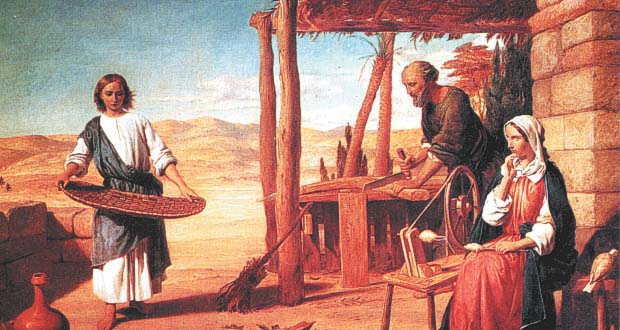By Fr. Charles C. Fiore, (1934 -2003)
Every Catholic knows the primacy of love in the Christian life. Jesus’ words (Mt. 19:19 and 22:37) about love of God and love of one’s neighbor as oneself immediately come to mind, as does St. Paul’s warning (I Cor. 1:13) that without charity as a motive, all that we do becomes “sounding brass and tinkling cymbal.”
The Christian family, so intended by God and aided by the sacramental grace of marriage, is “the school of love,” where spouses and children teach each other and learn, by trial and error, by mutual forgiveness and good example, how to love, how to go with Jesus to the Father.
Without question, homeschooling can be a boon in all this because of the give-and-take of family life. While it is not always evident in some families, and may appear tenuous in others, it is fundamental that parents and children share a natural intimacy of heart and soul that provides a “blessed floor” on which the life of the family plays itself out, and where, cleaned and swept by good will and forgiveness, we ourselves learn and help others in our families to learn what love is all about. Whatever hurts, misunderstandings, and outright disagreements occur, the solidarity of the family ordinarily is a given, an unquestioned haven, a bedrock of compassion, the focus of truth.
It is in the context of our human circumstances—our personalities within our families—that actual and sanctifying graces usually come, and in which they ordinarily work. The family is the arena that graces permeate, cleanse, and elevate to supernatural intimacy with the Holy Trinity.
Family life is the object of the specific sacramental grace of marriage, which the spouses may, and should, daily call down on their families as a matter of justice.
Indeed, the benefits of this sacramental grace for their spiritual needs and their children’s needs flows in large measure from the “contract” they made with God in their marriage vows. Those benefits are their entitlements, something they may demand, so long as they are in the state of grace, from Jesus who promised that He would not be outdone in charity (Lk. 6:27-28), and would “not leave [us] orphans” (Jn. 14:18).
That is the theory and the focus of the Christian life: love God and love your neighbor as yourself.
As every recipe is made up of ingredients, so too one’s ability to love virtuously is the result of the coalescence and interplay of other virtues: the four supernatural cardinal virtues: prudence, justice, fortitude, and temperance.
These four virtues are called “cardinal” from the Latin word for “hinge,” that is, the living of the Christian life hinges upon their implementation in the lives of the faithful, and a great many other subsidiary virtues “hinge” upon, are connected with or related to them. These four cardinal virtues, with the activity of the three theological virtues of faith, hope, and charity as their common objective, make possible the Christian life: love of God and love of neighbor as oneself.
Put another way, faith, hope, and charity are clearly the greatest of the virtues.
But prudence, justice, fortitude, and temperance give us the constitutive parts, the means, the guidelines, in how to love.
The Christian, the follower of Jesus, must always love prudently (wisely) and justly (observing the rights of others), at times in the face of great doubt or difficulty (with fortitude), and always temperately, not unreasonably but with self-mastery. Without the pervasive influence of prudence, one cannot be truly just, brave, or temperate in thought, word, or deed.
The supernatural four cardinal virtues are meant to modify and inform all our human acts, our deliberate and thoughtful words and deeds, so that our faith, hope, and charity are solid and properly Christian.
Our practice of the moral life here and now is dependent, first of all, on our vision or understanding of how the general principles of the Gospel are to be applied in these present circumstances.
Supernatural prudence, sometimes defined as “right reason, enlightened by grace, applied to doing things,” combines one’s theoretical knowledge and the dictates of a properly informed conscience. In the light of these, prudence tells us to “Do this” or “Don’t do that” here and now. It need not be a long deliberative process. It can happen quickly for one practiced in virtue. Prudence is eminently practical.
The process of prudence has to do with making morally correct decisions about the things we think and say and do, here and now.
Loving God and our neighbor as ourself is never easy. The practice of the cardinal virtues as means to the love of God and neighbor is a light for our minds, as well as for our hands and feet.
The author, Fr. Charles Fiore, was a great friend of the Catholic homeschooling movement and the Catholic pro-life movement.
Has there been a particular priest in your life that brought you closer to the Faith? A religious that has a special place in your memories?

 Seton Magazine Catholic Homeschool Articles, Advice & Resources
Seton Magazine Catholic Homeschool Articles, Advice & Resources
